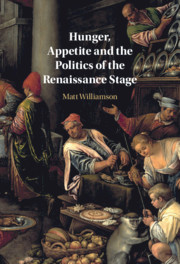Book contents
- Hunger, Appetite and the Politics of the Renaissance Stage
- Hunger, Appetite and the Politics of the Renaissance Stage
- Copyright page
- Contents
- Acknowledgements
- Introduction
- Chapter 1 Thinking through Hunger and Appetite in Renaissance England
- Chapter 2 Service
- Chapter 3 The Food Gift
- Chapter 4 Sexual Desire
- Chapter 5 Female Food Refusal
- Chapter 6 Imperial Appetites
- Chapter 7 Revolt
- Conclusion
- Bibliography
- Index
Conclusion
Published online by Cambridge University Press: 28 May 2021
- Hunger, Appetite and the Politics of the Renaissance Stage
- Hunger, Appetite and the Politics of the Renaissance Stage
- Copyright page
- Contents
- Acknowledgements
- Introduction
- Chapter 1 Thinking through Hunger and Appetite in Renaissance England
- Chapter 2 Service
- Chapter 3 The Food Gift
- Chapter 4 Sexual Desire
- Chapter 5 Female Food Refusal
- Chapter 6 Imperial Appetites
- Chapter 7 Revolt
- Conclusion
- Bibliography
- Index
Summary
The Conclusion asserts the centrality of hunger and appetite for understanding the politics of the Renaissance stage. It notes that attention to the representation of hunger and appetite provides a framework to understand not simply contemporary political discussion in general, but also the specific conditions in which political meaning could be generated in the theatre as an institution. It considers the complex relationship of hunger and appetite in these texts to issues of socio-economic change, political praxis and gender. It acknowledges the extent to which hunger and appetite are imbued with a particular significance by the processes of material change which defined early modern society. But it also emphasises the extent to which these drives continue to exert a fundamental influence upon the material base of society in the world today, and retain much of their significance as the method and matter of political resistance.
- Type
- Chapter
- Information
- Hunger, Appetite and the Politics of the Renaissance Stage , pp. 201 - 208Publisher: Cambridge University PressPrint publication year: 2021

